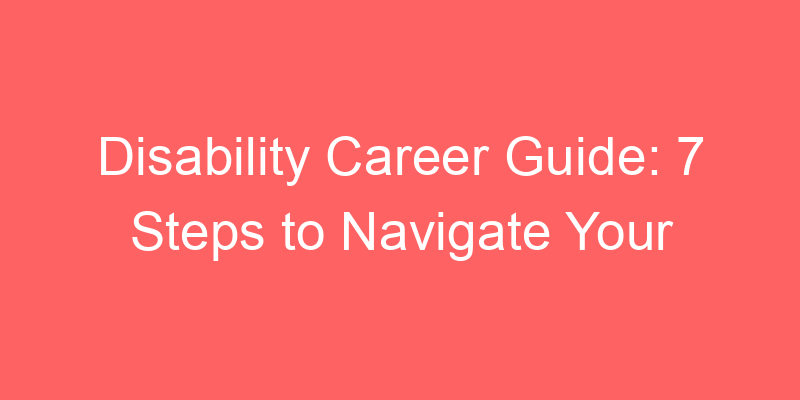Disability Career Guide: 7 Steps to Navigate Your Professional Path
Disability Career Guide: Essential Steps
Navigating a career with a disability presents unique challenges and opportunities. This guide offers practical advice and insights to help individuals with disabilities achieve success in their professional journeys.
Understanding Career Paths for Individuals with Disabilities
Why is Career Planning Important for Individuals with Disabilities?
Career planning is crucial for individuals with disabilities to identify suitable job opportunities, leverage their strengths, and access necessary accommodations and support in the workplace.
Key Steps to Navigate Your Career with a Disability
1. Self-Assessment and Goal Setting
Begin by assessing your skills, interests, and career goals. Identify strengths and areas for development, considering how your disability may impact your career choices.
2. Researching Disability-Friendly Employers
Research companies known for their inclusive hiring practices and accommodations for employees with disabilities. Explore job boards and disability-specific career fairs to connect with potential employers.
3. Networking and Building Support Systems
Networking is essential for advancing your career. Join disability advocacy groups, attend industry events, and connect with professionals who can offer mentorship and guidance.
4. Resume and Cover Letter Tailoring
Craft a tailored resume and cover letter that highlight your skills, experiences, and accommodations you may need. Emphasize your ability to contribute to the organization’s success.
5. Interview Preparation and Disclosure
Prepare for interviews by practicing common questions and scenarios. Decide when and how to disclose your disability during the interview process, focusing on your qualifications and abilities.
6. Workplace Accommodations and Rights
Understand your rights under the Americans with Disabilities Act (ADA) and explore workplace accommodations that can enhance your productivity and comfort on the job.
7. Career Development and Continuous Learning
Invest in ongoing professional development through workshops, certifications, and online courses. Stay updated with industry trends and technologies to remain competitive in your field.
FAQs about Career Disability Career Guide
How can I disclose my disability during the job application process?
Disclose your disability during the job application process strategically. Focus on highlighting your qualifications and readiness for the role before discussing accommodations you may need. For example, if you require specific software accessibility, mention how you have successfully used it in previous roles.
What are some effective networking strategies for individuals with disabilities?
Effective networking strategies for individuals with disabilities include joining disability-specific professional networks, attending virtual and in-person events, and connecting with professionals in your desired field through LinkedIn or industry forums.
How can I find disability-friendly employers?
Finding disability-friendly employers involves researching companies known for their inclusive policies and accommodations. Use resources like disability job boards, career services at disability advocacy organizations, and networking events focused on disability employment.
What types of accommodations can I request in the workplace?
Common workplace accommodations for individuals with disabilities include accessible workspaces, assistive technology, flexible scheduling, modified job duties, and support from disability resource groups within the organization.
Should I disclose my disability in my resume or cover letter?
It is not necessary to disclose your disability in your resume or cover letter. Focus on highlighting your qualifications, skills, and achievements relevant to the job. You can discuss accommodations during the interview stage, if necessary.
How important is professional development for individuals with disabilities?
Professional development is essential for individuals with disabilities to enhance their skills, stay competitive in the job market, and pursue career advancement opportunities. Continuous learning demonstrates your commitment to growth and adaptation in your career.
Navigating a career with a disability requires proactive planning, advocacy, and leveraging resources
Chart Your Course: A Guide to a Fulfilling Disability Career
People with disabilities possess a wealth of talent, skills, and experiences to contribute to the workforce. A disability career can be just as rich and rewarding as any other. Whether you’re just starting your career journey or looking for a new direction, this guide empowers you to navigate the exciting world of work and find a role that aligns with your passions and abilities.
Understanding Your Strengths
The first step to a fulfilling disability career is self-discovery. Take some time to reflect on your strengths, interests, and goals. Here are some questions to get you started:
- What are you passionate about?
- What skills do you excel at?
- What kind of work environment would you thrive in?
- What accommodations might you need to be successful?
Once you have a better understanding of yourself, you can start exploring different career paths.
Exploring Opportunities
The good news is that there are a vast number of disability career options available! Here are a few examples to spark your imagination:
- Technology: Individuals with disabilities are often tech-savvy and detail-oriented, making them well-suited for roles in software development, web design, and data analysis.
- Customer Service: People with disabilities can excel in customer service positions where patience, empathy, and excellent communication skills are key.
- Education: Teachers, teacher’s aides, and educational support professionals with disabilities can bring unique perspectives and understanding to the classroom.
- Entrepreneurship: Many individuals with disabilities are choosing to chart their own course by launching successful businesses.
Building Your Skills
Many resources are available to help you develop the skills and knowledge needed for your chosen disability career. Consider enrolling in vocational training programs, online courses, or workshops. Don’t hesitate to leverage disability support services offered by government agencies or non-profit organizations.
Crafting a Stellar Resume and Cover Letter
When applying for jobs, it’s crucial to highlight your skills and experiences effectively. Here are some tips for crafting a compelling resume and cover letter:
- Focus on your abilities. Don’t dwell on your disability.
- Quantify your achievements whenever possible.
- Use strong action verbs to describe your past experiences.
- Tailor your resume and cover letter to each specific job you apply for.
Finding Support
There’s no need to navigate your disability career journey alone. Here are some resources that can provide support and guidance:
- Government agencies: Many government agencies offer programs and services specifically designed to help people with disabilities find employment.
- Non-profit organizations: Numerous non-profit organizations advocate for the rights of people with disabilities in the workplace and offer career counseling, job training, and mentorship opportunities.
- Disability career websites: Several websites cater to job seekers with disabilities, providing job listings, career advice, and resources.
Remember, you are capable and deserving of a fulfilling career! With dedication, self-belief, and the right support system, you can achieve your professional goals and thrive in the workplace. Now go out there and conquer the exciting world of disability careers!
Career Disability Career Guide
Understanding Career Challenges with Disabilities
Entering or advancing in the workforce with a disability presents unique challenges. From navigating employer expectations to leveraging strengths effectively, success often hinges on strategic planning and proactive measures.
Career Advice and Tips
Individuals with disabilities often benefit from tailored career advice to navigate their unique challenges. Here are some essential tips:
- Focus on your strengths and skills that are relevant to the job market.
- Research companies with inclusive hiring practices.
- Consider disclosing your disability when it can help with accommodations.
- Utilize support networks and disability services for job search strategies.
Resume FAQs about Disability Careers
When crafting a resume as a person with a disability, common questions include:
- Should I mention my disability on my resume?
- How do I address gaps in my employment history due to my disability?
- What format works best to highlight my skills and experience?
Provide 10 Similar Jobs Related to Career Disability
| Job Title | Description |
|---|---|
| Disability Rights Advocate | Advocate for the rights of disabled individuals, influencing policy and awareness. |
| Accessible Technology Specialist | Develop and implement technology solutions for accessibility in various industries. |
| Job Coach for Disabled Individuals | Provide guidance and support to disabled individuals in job training and placement. |
| Disability Employment Specialist | Connect disabled job seekers with suitable employment opportunities and resources. |
| Assistive Technology Trainer | Educate disabled individuals on using assistive technology to enhance workplace productivity. |
Resume Strategies for Disability Careers
Effective resumes for individuals with disabilities often emphasize skills and achievements relevant to the job, while addressing potential gaps or accommodations needed. Tailor your resume to showcase how your disability enhances your unique perspective and problem-solving abilities.
Career Path Visualization for Disabled Job Seekers
| Entry-Level | Mid-Level | Senior-Level | Executive-Level |
|---|---|---|---|
| Intern or Trainee in Disability Services | Disability Services Coordinator | Director of Disability Programs | Chief Diversity Officer |
| Entry-Level Accessibility Tester | Accessibility Consultant | Senior Accessibility Engineer | Chief Technology Officer (CTO) |
Conclusion
Navigating a career with a disability requires resilience, strategic planning, and leveraging support networks. By focusing on your strengths, leveraging assistive technologies, and seeking out inclusive employers, you can build a successful and fulfilling career path.
Generate Your NEXT Resume with AI
Accelerate your resume crafting with the AI Resume Builder. Create personalized resume summaries in seconds.




